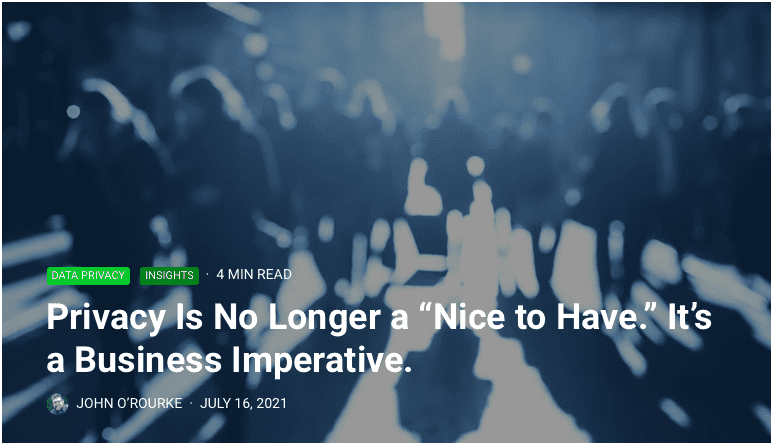Although the death of the cookie has received a recent—but temporary—reprieve from Google, a cookie-less world is on the horizon and businesses can no longer afford to be opaque about privacy. Overarching consent forms, one-line privacy disclosures, and other misleading tactics won’t stand the test of time—and we’re seeing a shift in the mindset of consumers and in the privacy game.
While tech pioneers such as Apple, Google, and Twitter have been leading in privacy ethics for some time, many companies still sidestep ethical, transparent data practices rather than adopt a mindset that prioritizes customer privacy and ethics. Data use in the correct context is clear and understood. For example, when you show your ID as proof of age, you don’t expect that individual to take down your address and send you a marketing promotion. Why is it any different when using products and services? It’s time businesses provide the transparency consumers are asking for.
Privacy is no longer a “nice to have.” And today’s focus on the ethics around privacy is much more than a cultural moment, it’s a moment for businesses to grasp and use to lead. With businesses thinking they are doing better, and consumers thinking businesses are doing worse, you’re left with an area of ownable strategic whitespace. Here are some initial privacy guidelines to get you started.
The privacy revolution
Have you seen how industry leaders are building new ways to approach customer data? There’s a change in the air, and instead of believing privacy has no business value, why not acknowledge its potential? Don’t just look at the short-term profits from leveraging data, look toward the long-term trends—millennials and generations that follow are more privacy conscious, with a higher awareness of what they opt in to. Don’t get hung up on the compliance hoops, legal roadblocks, and security headaches that additional privacy safeguards bring. Think about how you can mold them into what they really are: value propositions for your customers. Consider Unilever’s perspective when it comes to data ethics: they go beyond bare-bones compliance in order to ensure a customer-first system. Then the question becomes, how do you turn cost centers into a value center? You pitch it as an extension of your business. Ingrain it into your solutions and build upon those. Your customers will notice.- Advertisement –
When Uber welcomed privacy into the way they do business, they began scaling their efforts and didn’t let it hinder them from being innovative. Understand that even though you can build a top-notch, sustainable privacy program, you won’t see profits overnight. But you can still act now. Like any other pillar of your business, first establish a baseline, then set goals and continually assess them internally, building programs to reach those goals.
Stronger customer connections
How could a shift in…
Read The Full Article at CPO Magazine



